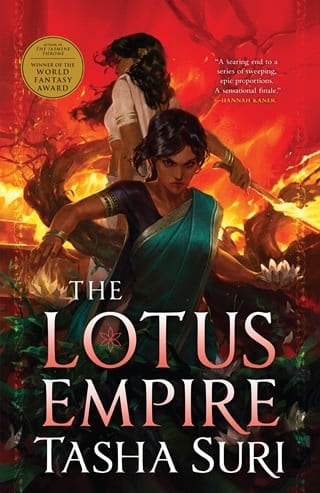Chapter 5 Priya
PRIYA
Priya walked slowly toward the mahal, trying to ignore the dread that was worming its way through her. She didn’t know what she would find.
The yaksa had not come with her. They had simply let her leave, let her stumble back into the cold, bright air beyond the Hirana. But she could feel them as if they were with her. They were in her ears, her beating heart, her blood.
The green was within her, after all. And they were within the green.
Once, she’d felt Ahiranya like a limb—all its green a stretching, powerful part of her. Now she felt like she was Ahiranya: so enmeshed that when she breathed, the trees swayed, and the soil shifted, moving with her.
She could feel the mahal too, through the green that had consumed it. Its once beautiful sandstone was splintered. Lichen and creeping vines had crept through the stone; the flowers that grew from them were pulsing, bright, breathing alongside her. She could feel them all—like she could clench a fist and crumble the mahal in its entirety.
Could she? Surely not. Surely.
But Mani Ara had made something new of her. She didn’t know the limits of her new strength.
She walked into the mahal, through once familiar corridors. Pillars—once carved from sandstone, high and sweeping—were broken. The roof should have fallen in without their support, but the stone had been replaced by living trees, the trunks rising through the ruptured floor, branches clasping the roof, fronds of leaves falling like curtains.
I can hold the ceiling , she thought coolly, or destroy it. With a twitch of my fingers.
The voice in her head didn’t sound like her own.
She forced herself to think normally: to think like a human, with the kind of practical, bone-deep compassion she knew was human too.
People can’t live like this , Priya thought. And then the realization hit her, on its heels.
People can’t live like this, but yaksa can.
I can.
Whether or not people could live here, they were certainly making their best efforts. The rooms that lined the corridors had been turned into makeshift bedchambers and prayer rooms, and there were more people around by far than there should have been. It took her a long moment to mark the beads of sacred woods at different wrists and throats. The vials of deathless water, broken from the source, strung at waists. Worshippers. So many of them, and many of them armed.
No one noticed her at first. She probably looked no different from the rot-riven. Then she saw an older woman striding along the corridor and felt a breathless shock of recognition.
Kritika, leader of the mask-keepers, saw her in return. Kritika’s face went tight, as if shock and fear had both caught her unaware, neither gaining the advantage on her face, leaving her expression a rictus.
“Elder Priya,” she said, her voice a rasp. “Are you… are you, you ?”
Priya nodded, wordless. Her lungs felt empty, her mouth useless.
Kritika bowed low. When she raised herself up, her eyes were shining with tears, her expression determined.
“The yaksa have brought you back to us,” she said, voice trembling. “I am so glad, Elder.”
Funny. Priya had never thought Kritika particularly liked her. But Kritika was looking at her now, hopeful, eager, and Priya… Priya had to say something profound, didn’t she? She racked her brain.
“I’m really hungry,” Priya said, her voice cracking.
Billu fed her.
Kritika led her to the kitchen. Guiding her, like Priya wouldn’t know where the kitchen was anymore, even though she’d once visited it multiple times a day. In the open courtyard, by the ovens and the ever-simmering vat of tea—that vat was likely to survive longer than any of them—Priya stood and ate, and drank nearly a whole jugful of water on her own. She ate like a feral thing, a starving animal, because her body was animal and hungry and she had no energy to conceal it.
The household gathered around her: Billu, who ruled the kitchens; Khalida and the maids, who had become the household’s masters in the time since Ahiranya’s independence; ex–imperial guards—but no Jeevan; and finally Ganam and the other mask-keepers, who were clustered around Kritika like children. She recognized them all. And recognized that they were all watching her, curious and wary-eyed, as if she were a hawk in a cage, or a serpent caught on the end of a stick, beautiful but liable to attack if provoked.
“Where have you been?” one mask-keeper finally blurted out. That broke the tension. Immediately, one of the laundresses added, “You look so thin, Priya. Were you with the empress’s army this whole time? Did you come back here alone?”
“You haven’t heard,” Priya said numbly. She looked from face to face. “None of you have. Have you?”
“Heard what?”
“Our borders are shut,” Ganam said flatly. “Anyone who tries to leave or enter dies. We know what’s happened in Ahiranya. Nothing beyond that.”
The food turned to nausea in her stomach. They didn’t know.
The yaksa hadn’t even spoken of it directly. It was Priya who’d said to them that she had cut out her own heart. She remembered it now, in sickening flashes: Malini, and the trust in her black eyes; the way they looked when that same trust snapped, a string brutally cut.
“I stabbed the empress,” Priya said, more calmly than she’d thought she was capable of.
A beat of shocked silence.
“Does… does she still live, Elder?” Kritika finally asked.
“Yes,” Priya said. But what followed was a fist of dread that gripped her straight round the heart, her lungs, making her air small.
How could she know if Malini had lived or died? She couldn’t know. She knew how wounds could fester, even with the best care. She knew how fiercely, too, that Malini wanted to live. Was desire enough?
She breathed through her feelings and bullied the fear down. She took another mouthful of food. She chewed hard on her roti, the bread grinding down to soft pulp between her teeth, giving herself time to recover, to think. To be silent.
“Why did you do it?” a maid asked.
Priya swallowed and said simply, “The yaksa asked it of me.”
“Then it was deserved,” Kritika said determinedly. “And it was necessary. We must trust the yaksa,” she stressed, as if the others had argued this point with her.
They didn’t reply, and neither did Priya. She wasn’t sure she needed to. She swallowed a mouthful of tea instead, blistering hot.
“I know Bhumika isn’t here,” she said instead. Her voice shook only a little.
“She vanished.” Billu’s face was impassive. “One day she was here, and then she wasn’t.”
So no one knew what had happened to Bhumika.
“Is Padma safe?” Priya asked. “And Rukh—”
“They’re both here and safe,” Billu said. “You don’t need to worry about Rukh. Or the baby.”
“Where are the soldiers who went with you to war? And where is Sima?” Ganam asked, eyes dark, expression grim. Like he already knew what her answer would be. “Are they safe elsewhere?”
Her throat closed up.
She did not, could not, know what had happened to Sima among the Parijatdvipans. But she’d left Sima there in the hope that whatever awaited Priya in Ahiranya, Sima would be safe from it.
“The war was risky,” she said. An answer and no answer at all—she’d let them make their own assumptions.
“They’ve done something to you,” Khalida blurted out. Then she covered her mouth with her hand, eyes frightened, darting. There was some uneasy shuffling of feet. Murmuring voices.
Priya thought of the vines and leaves around them—the way they were like an extension of her own eyes and ears. The way the yaksa lived in them, saw through them, felt through them, just as she did.
“Don’t worry,” Priya said. “Even if the yaksa can hear you, they know what they’ve done to me. It won’t upset them to hear you’ve noticed—me.”
“Lady Bhumika doesn’t look like this,” Khalida said, voice cracking a little, as she gestured one trembling hand at Priya. She swallowed, and when she next spoke there was a forced steadiness to her words. “She looks like herself.”
“Looked,” one of the mask-keepers corrected, their voice a mutter.
Priya resisted the urge to touch her own face—to feel the alienness of her skin. She clasped her own hands together.
“I am glad you are here to lead us,” Kritika said, her voice pointedly pitched to drown them out. “We need a thrice-born elder to lead us. Just as the ones who came before us had in the Age of Flowers.” She looked at Priya fiercely, as if she could reshape Priya into something worthy of all her hopes by just staring her down. “Everything will be better now.”
I’m not Bhumika , Priya wanted to say immediately. I’m not the one you should really be looking at for guidance. I did my work, trying to heal the rot and guarding our land from imperial soldiers, and it wasn’t enough. I’m not… not a leader. Not what you’re looking for.
But she could not say it. She couldn’t afford to hide in Bhumika’s shadow. There was no Bhumika to hide behind anymore.
Where are you, sister? Are you even alive?
The household was quiet. Wide-eyed. Hanging on her silence, waiting for her words.
“We can start making things better,” she said, trying to sound strong and practical. “I can tell the mahal is falling apart. I’ll see to that.”
“You’ve learned carpentry in the empire?” Ganam inquired, raising his eyebrows. Khalida gave a hiccupping cough, then covered her mouth hurriedly.
That was good. A little sharpness, a little humor, meant that they still recognized her as her .
“I can’t make things worse,” she said, trying for a grin. It felt strange on her face. She let it drop swiftly. “What else needs to be done? Whether you think I can do it or not—just tell me.”
There was a long pause—and then suddenly everyone was talking at once.
“—food stores aren’t enough for all the pilgrims, never mind the city, and the highborn are hoarding —”
“If we’re going to talk about the pilgrims—”
“—impossible to get all the raw materials we need with the borders shut as they are—”
Now that she’d asked, she regretted doing so. The words pounded against her skull. She felt suddenly weak. She was with her own people, and she was almost—almost—safe. It was enough to make all the exhaustion she’d been holding back come over her in a wave.
“Tomorrow we’ll make a start,” she said. “Today and tonight, I rest. But tomorrow—we do the yaksa’s work, and we do our own. And we survive.”
She collapsed on the bed in her old chambers. She slept curled up on her side, her knees tucked to her chest. Even tangled in her own dirt-stained sari, she could see the shimmer of green life under her own skin, and feel the pulse of Ahiranya beating like blood in her veins. She forced her eyes shut and tried, oh tried, to dream human dreams. Her body was animal-tired, but the rest of her was vast, drifting—
“Priya,” a voice said. It was young. Hesitant.
She opened her eyes. It was day, hot, light. She saw a figure, and knew it, knew him, even before he stepped from the shadows into the spill of light from the window.
“Rukh,” she said. There was a bundle in his arms, a small face with dark curls turned against his shoulder. Priya straightened in her bed, suddenly awake. “Is that…?”
“You can’t hold her,” he said warily.
Was it because she wasn’t quite human anymore? Did he fear she was a yaksa?
“I won’t,” she said. She sat up properly, tucking her feet under her.
For all her fears of being not quite human, her heart was racing. She felt shaky with the intensity of seeing him, of seeing Padma, safe and whole in his arms. Perhaps a little sleep had been enough to restore all the soft, terrified parts of her.
“Look at her,” Priya said, voice a little choked. “She’s so big now. How—how is she?”
Rukh was silent for a long moment, his eyes large, watchful. There was so much feeling in them that she couldn’t read or understand.
“She… she’s not loud like she used to be,” Rukh said eventually, a telltale wobble to his voice as he looked at Priya and held Padma tight, so tight. “But I guess that’s—normal. Considering. Everything.”
How could Bhumika have left Padma behind? Priya couldn’t fathom any of this. The question was an ache.
Bhumika had to be dead.
“I won’t touch her,” Priya said. “I promise. But you can come and sit beside me, if you like. She must be heavy.”
Hesitation, again. She saw him swallow. He shifted on his feet, like he didn’t know if he wanted to stay or flee.
“I don’t know if you’re… you,” he said.
“That makes sense,” Priya said, thinking of the teary horror in Khalida’s eyes, and the determined, forceful hope in Kritika’s. “But why did you come to me, Rukh? If you think I’m something the yaksa made, or if you think I’m one of them…” She exhaled and felt the rustle of flowers growing through the bedding beneath her. She forced them away. Wither. “I know you’d risk yourself out of curiosity,” she went on. “That’s your way. It doesn’t surprise me. But her—ah, Rukh, that’s not like you.”
“I couldn’t leave her,” he burst out. “And I wanted to know if you—I hoped. I had to know if hoping was stupid. And if you’re one of them, if you’re a yaksa that looks like Priya, then nowhere’s safe from you. And if you’re Priya, then nowhere’s safer than with you. So.” He swallowed again, and she saw the tears streaking his face, miserable. “It’s all hope. That’s why.”
“I’m me,” she said softly, swallowing back her own tears. “You’re going to have to decide for yourself if you can believe that or not, Rukh. But as far as I know, I’m still me. Priya, and a temple elder, and human enough. So come sit. Or don’t. I’ll understand.”
“Will you?”
“Of course,” she said. “There’s always tomorrow. Maybe you’ll trust me then. Or maybe the day after that. I’m not going anywhere again.”
He stood still for a long, long moment. But Padma was heavy for him. She could tell. And he wanted to believe her.
He walked over to the bed and sat down. She didn’t close the distance between them but felt herself relax—some unknowable tension unspooling from her shoulders, her spine.
“How are you, Rukh?” Priya asked gently.
“Oh, everything’s awful here,” he said, trying to sound casual.
“I’m asking about you. About how awful it’s been for you, specifically. Go on. You can tell me.”
“I forgot you for a while,” Rukh said, voice hushed. He was rocking Padma back and forth in his arms, resting her cheek against his knee. It didn’t look like a comfortable position, but Padma was still half-asleep regardless, her face blotchy from crying, her eyes hooded. She was gnawing softly on her own fist. “I… the yaksa. The one that looks like Ashok. He did something to me, and it was like… like the memory of you was water, and I was taken away from the water, and so I didn’t have the memory anymore.”
He swallowed and lowered his head. Padma made a chuffing noise and tried to grab at the leaves in his hair, then settled again when he hushed her.
“But you remember me now,” Priya said.
“I do,” Rukh agreed. “It came back slowly. After he let me go. I just. I just wanted you to understand if I’m not the same…”
Priya huffed out a laugh. She waved her arm in front of herself, letting the light shine on her—on her green-dusted veins, the sap pearling at her fingertips.
“Yes,” she said. “Because I’m not changed at all.”
“That doesn’t make me happy,” Rukh said seriously. “Everyone says the yaksa… transformed you. Under the Hirana.”
“They changed me before that,” said Priya. “But it doesn’t matter. I’d rather hear about you.”
Rukh shrugged, careful not to jostle Padma too much. She had her eyes fully closed now. “You know everything that happened to me,” Rukh said. “That one big thing—that was it.”
She gave the child in his arms a pointed look.
“Oh yes. Nothing else has changed,” she said dryly. “Where did you get Padma from?”
“She’s mine now,” said Rukh. “The yaksa gave her to me.”
“What?” Priya sat up properly. “ Gave her to you?”
“After Bhumika—left,” he said haltingly. “One of them said to me—she’s yours. Mine, I mean. So I can’t give her to anyone else. Not even Khalida, though she’s told me how to brush Padma’s hair. And Billu makes her food properly for me, all soft so she can eat it.”
“Why would the yaksa give her to you?”
“I don’t know why they do anything,” said Rukh. “Do you?”
She thought back to the Hirana. The things she’d seen there.
I might. I just might.
“She’s sad,” Rukh was saying, looking at Priya with careful eyes. “She used to run around everywhere, but I think she’s scared. She’s all clingy.”
“That’s no surprise.” Not after what Padma had lost. Spirits, she was so small still. Priya didn’t think she’d ever been as small as Padma was. “Do you have a sling for carrying her?”
Rukh shook his head.
“I’ll make you one,” she told him. “But for now…” She patted the blanket. “Come lie down next to me. You can keep on holding her if you like. And I’ll tell you what it was like, out there in Parijatdvipa. I won’t touch her.”
“Promise?”
“I promise.”
He told her how Ahiranya had been in her absence. About the forest closing in, shutting them off from the world, and the way food and supplies had run ever lower. How pilgrims had come to rely entirely on the yaksa. They’d come at first out of faith, and later they had come for food and healing and hope, which was another kind of faith.
He told her, and then when he started to cry again—silent, tired tears—she told him a little about the war. Just the softest, safest things: about how Saketa looked, the blueness of the sky, the vastness of it. Of the Veri river, and the white horses of the Dwarali riders; of the imperial mahal, and its grand, strange beauty. Tale after carefully woven tale, until finally Rukh stopped asking her questions. His head was tilted forward. He’d fallen asleep.
She looked at his slack face, the lines of green through the skin of his throat, and Padma’s closed eyes, their soft breaths mingling together—and felt her resolve solidify.
She couldn’t go after Bhumika.
She couldn’t have Malini again.
You are nothing , she said to her thoughts of Malini. You have to be.
She could protect the people here. She could protect Ahiranya. She could be their voice. Whatever the yaksa had done to Bhumika, Priya was Mani Ara’s, and she was too valuable to destroy.
That had to count for something.
She touched one of the leaves that grew profusely from Rukh’s head. The lightest touch.
You are nothing , she said again, to the ugly ghost of love still lingering in her own sap-rotten heart.
And this. This is everything.
 Fullepub
Fullepub 



